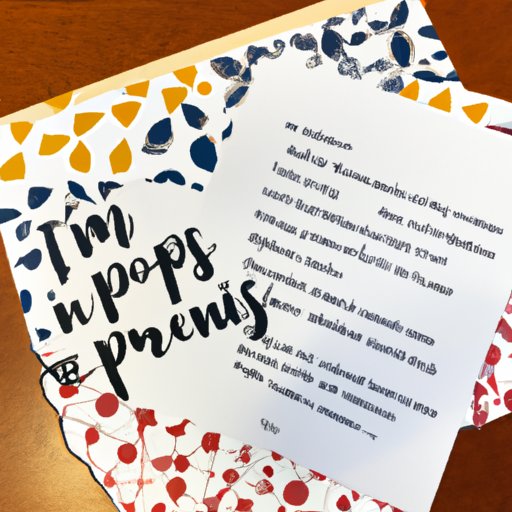
Introduction
Journaling is a powerful tool that can help you improve your mental health, become more self-aware, and manage stress. By putting your thoughts and feelings on paper, you create a safe space to explore your emotions, clarify your goals, and work through challenging situations.
In this article, we’ll explore some tips and tricks for starting a journaling practice. Whether you’re a beginner or looking to refine your skills, this guide will help you get started.
Choosing the Right Journal
One of the first steps in starting a journaling practice is choosing the right journal for your individual needs. When selecting your journal, you want to consider the size, style, and durability of the book. Some people prefer smaller, pocket-sized journals they can carry with them wherever they go, while others prefer larger, more elaborate journals that serve as a creative outlet.
Whatever your preference, make sure you choose a journal that inspires you and feels comfortable to write in. You want to choose a journal that makes you excited to open it up and start writing.
Setting Goals
Setting goals for your journaling practice can be a helpful way to stay on track and motivate yourself to continue writing. Whether you want to write for a certain amount of time each day or focus on a particular theme or topic, setting goals can help you maintain your momentum and see progress.
Start by thinking about what it is you hope to gain from your journaling practice. Are you looking to work through a specific issue in your life, or do you want to use journaling as a tool for self-exploration and self-discovery? Once you’ve identified your goals, create a plan for how you’ll achieve them.
Planning Your Entries
Planning your journal entries in advance can help you stay focused and make the most of your writing time. When you plan your entries, you give yourself a structure for your writing, which can make it easier to get started.
Consider setting aside a specific time each day for journaling, such as first thing in the morning or right before bed. You can also use journal prompts or prompts to guide your writing and help jumpstart your creativity.
Choosing Your Writing Style
There are many different journaling styles, from free-form writing to bullet journaling. Experimenting with different styles can be a helpful way to find what works best for you. Free-form writing is often the most common, but bullet journaling and other forms of creative journaling can be fun and rewarding.
Remember that there is no one right way to journal. Each person’s experience with journaling is unique, and you should feel free to experiment and find what works best for you.
Overcoming Writer’s Block
One of the most common challenges people face when starting a journaling practice is overcoming writer’s block. If you find yourself struggling to come up with things to write about, remember that writer’s block is normal and it happens to everyone.
Some tips for overcoming writer’s block include setting aside time each day to write, journaling about a particular issue or challenge that you’re facing, or using prompts to guide your writing. Remember that the act of writing itself can often help you overcome writer’s block.
Making Journaling a Habit
Last but not least, it’s important to make journaling a habit if you want to see the benefits of this practice. You can accomplish this by setting reminders for yourself, incorporating journaling into your morning or evening routine, or creating a daily or weekly journaling challenge.
Remember, the key is to find what works best for you and make journaling a regular part of your life. The more you practice, the more natural it will become.
Conclusion
Journaling is a powerful tool for personal growth and self-discovery. By starting a journaling practice, you can increase your self-awareness, manage stress, and work through challenging situations in your life.
To get started, choose a journal that inspires you, set goals for your writing, plan your entries, experiment with different writing styles, overcome writer’s block, and make journaling a regular habit. With these tips and tricks, you’ll be well on your way to a fulfilling and rewarding journaling practice.




